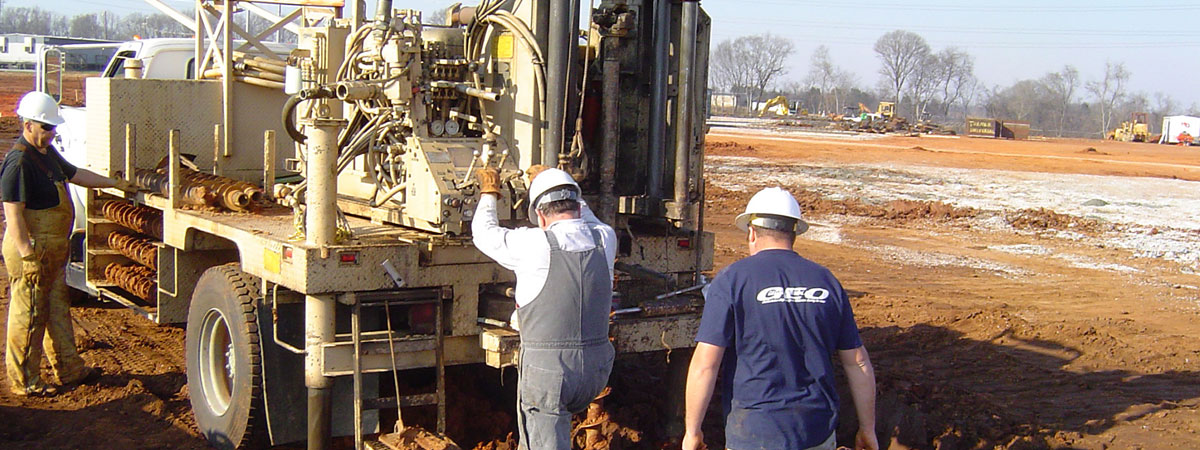Tailings Engineer: Crucial Proficiency for Sustainable Waste Monitoring in Mining
Tailings Engineer: Crucial Proficiency for Sustainable Waste Monitoring in Mining
Blog Article
Recognizing the Necessary Role of the Geotechnical Sector in Modern Building And Construction Projects and Facilities Advancement
The geotechnical industry is a foundation of modern building and construction and infrastructure growth, giving critical understandings right into soil habits that straight influence task end results. Through sophisticated dirt evaluations and ingenious design options, geotechnical professionals not just make sure structural honesty yet likewise address sustainability concerns amid progressing ecological standards.
Importance of Dirt Analysis
Soil evaluation plays a critical role in the geotechnical industry, working as the structure for notified decision-making in building tasks. Precise soil assessment is vital for determining the viability of a website for numerous kinds of frameworks, including property homes, industrial buildings, and bridges. By assessing soil composition, stamina, density, and moisture web content, designers can anticipate possible challenges and alleviate risks associated with ground instability, disintegration, and settlement.
The evaluation process typically involves a series of tests and monitorings that give vital info concerning the subsurface conditions. This information informs the design and construction procedures, ensuring that frameworks are developed on solid ground with ample support. Comprehending the soil profile makes it possible for designers to choose ideal building approaches and products, optimizing source utilization and minimizing expenses.
Along with making certain structural honesty, dirt evaluation contributes to ecological sustainability. By recognizing possible contamination or adverse impacts on bordering communities, designers can implement techniques to secure these natural deposits. Overall, detailed dirt evaluation is crucial in the geotechnical field, underpinning the safety and security, performance, and environmental responsibility of construction projects.
Key Geotechnical Techniques
A variety of key geotechnical techniques are used to improve the stability and evaluate and efficiency of construction sites. One foundational approach is dirt sampling and screening, which enables designers to determine the physical and chemical homes of the ground. This info is essential for making informed decisions concerning foundation layout and building and construction techniques.
An additional vital technique is website characterization, which includes the in-depth assessment of dirt and rock conditions through methods such as borehole boring and in-situ screening. Techniques like Criterion Penetration Tests (SPT) and Cone Infiltration Tests (CPT) offer beneficial data on soil toughness and stratigraphy.
Ground improvement techniques, such as dirt stablizing and grouting, are additionally important in enhancing the load-bearing capacity of weak soils. These methods can minimize negotiation and enhance overall website problems.
In addition, slope security evaluation is essential for identifying potential landslide threats and making certain the safety and security of excavations. This analysis typically employs mathematical modeling and limit equilibrium methods to predict dirt habits under various problems.
Incorporating these geotechnical strategies into building preparation not only optimizes job outcomes yet also guarantees the long-lasting sustainability of infrastructure advancement.
Influence On Construction Safety And Security

Furthermore, efficient geotechnical design entails executing reduction strategies for identified threats. This may consist of soil stabilization techniques, preserving frameworks, or drainage systems to relieve hydrostatic stress. By attending to these aspects, building teams can decrease the possibility of look at this site accidents and enhance employee security.
Additionally, constant tracking of site problems is essential during building. Geotechnical tools can provide real-time information regarding ground movement and security, enabling prompt treatments when necessary.
In essence, the geotechnical sector plays an essential function in securing building projects. By prioritizing ground honesty and using strenuous evaluation approaches, the geotechnical sector not just secures the labor force however additionally contributes to the longevity and integrity of constructed framework.
Sustainability in Geotechnical Practices

Additionally, geotechnical designers are now employing advanced modern technologies, such as geosynthetics, which improve soil stability while decreasing the volume of product needed. This not only preserves resources however likewise causes less waste generation (engineer of record). The integration of sustainable design principles into geotechnical engineering encourages the use of eco-friendly energy sources in construction processes, further decreasing carbon exhausts
By carrying out these analyses, geotechnical specialists can create methods that reduce damaging impacts, guaranteeing conformity with ecological laws. Overall, the emphasis on sustainability within geotechnical techniques not only adds to the longevity and durability of infrastructure but additionally advertises a responsible method to land and resource administration.
Future Trends in Geotechnical Design
Advancement is driving the future of geotechnical design, as arising innovations and approaches reshape the Click This Link market. The integration of sophisticated information analytics and expert system is set to revolutionize website investigation and threat assessment, making it possible for engineers to make more informed decisions based on real-time data. The use of geosynthetic products is acquiring grip, providing lasting options that boost soil stability and decrease ecological impact - engineer of record.
An additional substantial fad is the adoption of automated and robot systems for surveillance and construction processes. These technologies not only improve accuracy however likewise improve security by lessening human involvement in unsafe settings. In addition, the application of Building Info Modeling (BIM) in geotechnical style assists in improved partnership among stakeholders, maximizing task shipment and decreasing costs.
As climate adjustment presents new challenges, the market is significantly focusing on resilience and adaptability in layout methods, guaranteeing framework can endure extreme weather condition occasions. Finally, the recurring pattern toward sustainability will certainly drive technology in environmentally friendly materials and methods, straightening geotechnical design with more comprehensive environmental objectives. Jointly, these fads will shape a much more efficient, sustainable, and resilient geotechnical landscape for future projects.
Verdict

The geotechnical look at this site industry is a foundation of contemporary building and construction and facilities development, offering essential insights into soil actions that directly affect project end results. geo tech engineer.Dirt assessment plays a crucial function in the geotechnical market, offering as the foundation for educated decision-making in construction tasks. Overall, detailed soil evaluation is indispensable in the geotechnical field, underpinning the security, performance, and ecological duty of building projects
Construction safety and security is substantially influenced by geotechnical techniques, as the security and integrity of the ground straight affect the general security of a building and construction website.In conclusion, the geotechnical sector is essential in modern-day construction and framework development, offering essential evaluations that guarantee structural stability and safety.
Report this page